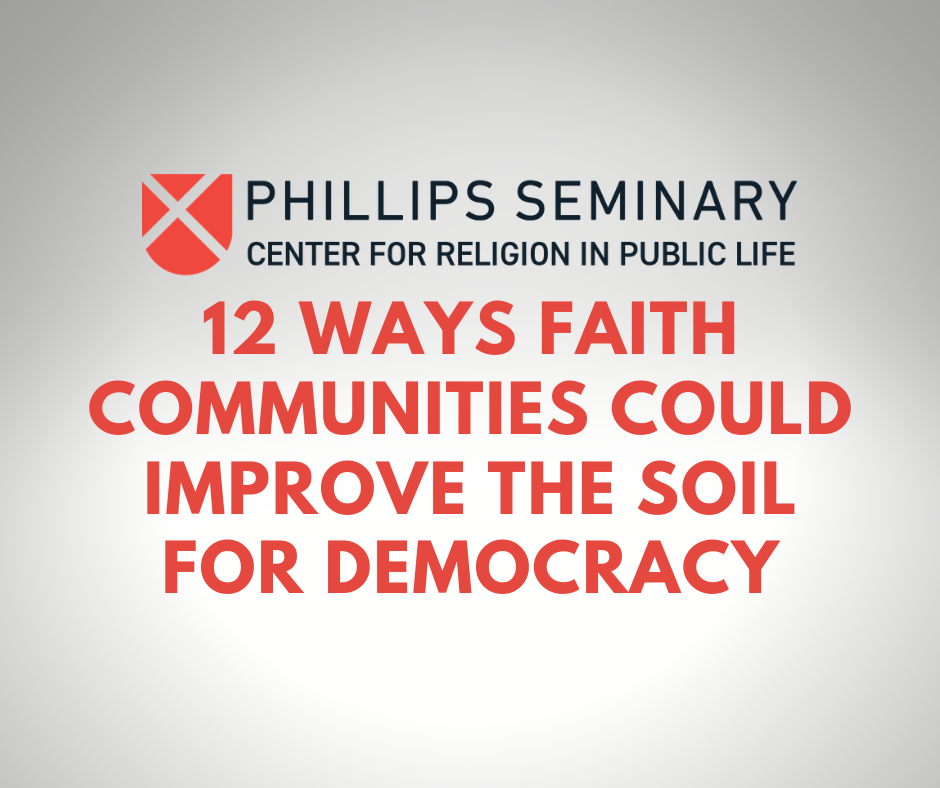12 Ways Faith Communities Could Improve the Soil for Democracy
During October and through election week, I taught a free, online course. The topic was how people of faith might foster the regeneration of democracy in the U.S.
The course was premised on several assumptions. One assumption is that the cultural soil for growing a healthy democratic society is insufficient and is, itself, unhealthy. Another assumption is that people of faith could contribute to improving the soil. What do people of faith know that could improve the soil for a democracy that would make for a more whole society?
 In the final class session, I offered 24 proposals. Each proposal imagines what people of faith already know, or have known and could know again, that could help regenerate the spirit of democracy in the U.S.
In the final class session, I offered 24 proposals. Each proposal imagines what people of faith already know, or have known and could know again, that could help regenerate the spirit of democracy in the U.S.
For this week and next in this blog, I present the proposals. (If you’d like to watch any of the five lectures and four interviews that comprised the content of the course, you can do so here. You can download a PDF file of these 12 proposals here.)
Use your imagination.
People of faith know:
- There is something/someone greater than ourselves, and greater than any nation. A fitting spirit of democracy would recognize that “we the people” are not the greatest power on earth.
- The universe is creation and not simply “nature.” A fitting spirit of democracy will consider resource usage in terms of I-thou and not simply I-it relationships. To use a phrase I heard recently: the earth is not our candy store.
- How to interpret and keep high the importance of mystery, awe, and wonder. A fitting spirit of democracy recognizes that no human being or nation is Ultimate, nor can everything be possessed, controlled, or owned.
- Human beings are creatures and part of this living planet, we are groundlings, of the earth. “From dust… to dust.” A fitting spirit of democracy is not afraid to talk about limits. The planet is created for all living beings, not simply for humans, or for Americans.
- Human beings are equal before the Ultimate. All forms of inequality are human creations. A fitting spirit of democracy protects rights and limits the level of inevitable inequalities.
- Human beings are mortal and fallible. Humility is a virtue. A fitting spirit of democracy invites correction. Any form of governance could be improved, will fall short, make mistakes, and need to rectify its mistakes.
- Life is a gift; gratitude is a logical stance toward life. A fitting spirit of democracy does not, except in extraordinary times, require persons to give the gift of their lives.
- How to deal with suffering and death. A fitting spirit of democracy recognizes its limited role in addressing finitude and mortality; but a spirit of democracy can foster compassion for persons and their families in times of suffering.
- Love is more powerful than hate. A religious community can be a leaven of love in society—or a leaven of hate. A fitting spirit of democracy is loath to invoke hate and to suppress love.
- The proper definition of peace as shalom (not merely the absence of conflict) includes both inner and outer dimensions. A fitting spirit of democracy is not, by itself, sufficient to form the personal and public centers from which peace with justice is born.
- Community is essential to develop healthy persons. A fitting spirit of democracy must make and protect a social ecology that is friendly toward healthy communities.
- Religion’s ends/telos (to connect with the Ultimate) and the ends/telos of politics (govern, share power) are not the same. A religious/spiritual agenda should not be identical to a political agenda, and the means to reach an end also differ (persuasion v. coercion).
No one tradition or community embodies all of these “knowledges.” But what if the faith community in which you participate got really good at generating and sharing even a few of these? How might your faith community become a more effective leaven for love, compassion, and justice within your neighborhood, town, city, and state?
Imagine.
Dr. Gary Peluso-Verdend is president emeritus at Phillips Theological Seminary and is the executive director of the seminary’s Center for Religion in Public Life. The opinions expressed in this blog are those of the author. Learn more about the Center’s work here and about Gary here.


Comments are closed.